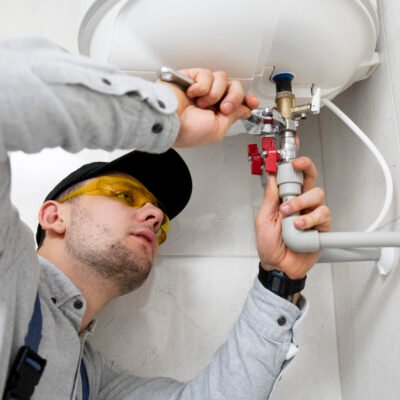Introduction to Water Heaters: Bringing Warmth to Your Home
Picture this: you stumble out of bed on a frosty Panchkula morning, only to be greeted by icy water in your shower. Not exactly the ideal start to your day, right? That’s where water heaters come to the rescue! These nifty devices work tirelessly behind the scenes to ensure that you have a steady supply of hot water whenever you need it. Whether it’s for bathing, cooking, or cleaning, a water heater is your ticket to warmth and comfort in the comfort of your own home.
Types of Water Heaters in Panchkula: Electric vs. Gas-Powered
Now, you might be wondering, “How exactly do water heaters work?” Well, there are two main types to choose from: electric and gas-powered. Electric water heaters harness the power of electricity to heat coils inside a tank, while their gas-powered counterparts rely on natural gas or propane for their heating prowess. Each type has its own set of advantages and considerations, so let’s take a closer look at what sets them apart.
They’re typically more affordable upfront and don’t require access to a gas line, making them a popular choice for many homeowners. However, they may cost more to operate in the long run, especially if electricity prices are high in your area.
On the other hand, gas-powered water heaters are lauded for their efficiency and lower operating costs. By harnessing the power of natural gas or propane, these heaters can quickly heat water to your desired temperature, ensuring that you never run out of hot water – even during peak usage times. However, they do require access to a gas line and may have higher upfront costs compared to their electric counterparts.
Choosing the Right Water Heaters in Panchkula: Factors to Consider
When it comes to selecting the perfect water heater for your home in Panchkula, there are several factors to take into account. First and foremost is your household’s hot water usage. Do you have a large family that’s constantly queuing up for showers? Or are you flying solo and only need hot water for the occasional dishwashing session? By estimating your hot water needs, you can choose a water heater with the appropriate capacity to meet your requirements.
Next up is the available space for installation. Some homes in Panchkula may have limited space for a water heater, so it’s essential to choose a model that fits comfortably within your designated area. Additionally, consider factors such as energy efficiency ratings, warranty coverage, and maintenance requirements when making your decision.
Benefits of Water Heaters: More Than Just Warm Water
Now, let’s talk about the myriad benefits of having a water heater in your home. Sure, hot showers are a luxury we all enjoy, but did you know that water heaters offer so much more than just warmth? Here are a few reasons why investing in a water heater is a smart choice for any Panchkula homeowner:
Convenience: Say goodbye to the days of waiting for water to heat up on the stove. With a water heater, hot water is available at the twist of a knob, providing instant comfort and convenience whenever you need it.
Energy Efficiency: Modern water heaters are designed to be more energy-efficient than ever before, helping you save money on your utility bills while reducing your carbon footprint. By choosing a high-efficiency model, you can enjoy all the comforts of hot water without breaking the bank.
Hygiene: Hot water isn’t just for showers – it’s also a powerful ally in the fight against germs and bacteria. Whether you’re washing dishes or doing laundry, hot water helps ensure that your belongings are thoroughly cleaned and sanitized, keeping your home happy and healthy.
Peace of Mind: With a reliable water heater in your home, you can rest easy knowing that hot water is always on standby, ready to tackle whatever life throws your way. Whether it’s a cold winter’s day or a spontaneous dinner party, you’ll never have to worry about running out of hot water again.
Safety Considerations: Keeping Your Home Secure
While water heaters are generally safe to use, it’s essential to follow proper installation and maintenance practices to ensure the safety of your home and family:
Installation: Always hire a qualified professional to install your water heater, ensuring that it’s done correctly and in compliance with local building codes.
Ventilation: Gas-powered water heaters require proper ventilation to prevent the buildup of harmful gases such as carbon monoxide. Make sure that your water heater is installed in a well-ventilated area to minimize the risk of exposure.
Maintenance: Regular maintenance is key to keeping your water heater running smoothly and safely. Schedule annual inspections and servicing by a licensed plumber to check for any signs of wear and tear and address them promptly.
By following these safety guidelines, you can enjoy all the benefits of hot water without compromising on your family’s well-being.
Cost Considerations: Finding the Right Balance
Of course, cost is always a consideration when it comes to home improvements. When choosing a water heater for your Panchkula home, it’s essential to weigh the upfront costs against long-term savings and benefits. Here’s what to keep in mind:
Upfront Costs: Electric water heaters tend to be more affordable upfront, making them a budget-friendly option for many homeowners. However, gas-powered water heaters may offer greater long-term savings on operating costs, offsetting their higher initial price tag.
Operating Costs: Consider factors such as energy efficiency ratings and fuel prices when calculating the long-term operating costs of your water heater. While gas-powered models may have lower operating costs overall, electric water heaters may be more cost-effective in areas with lower electricity rates.
By carefully evaluating your budget and long-term usage needs, you can choose a water heaters in Panchkula that strikes the perfect balance between affordability and performance.


